Would you like to arrange a talk for your group, club or society? If so you will find here a list of talks which are currently been offered together with booking information, a biography of Professor Linge and testimonials from groups who have already received a talk. Each talk is designed for a general public audience and is delivered as a multimedia PowerPoint presentation supplemented with a range of physical artefacts as appropriate. Depending on the audience a more technically orientated version of each talk can be delivered on request. Groups that have enjoyed one of these talks include Probus and Probex Clubs, Rotary Clubs, Women’s Institutes, Associations of the National Trust, the U3A, local history societies and Professional Institutions. This page provides a summary of each talk which is currently available. This list may also be downloaded as a PDF file and additionally, you can see a complete list of the groups who have already received a talk by clicking one of the buttons below. Please note that the list of talks is reviewed and updated from time to time.
Available talks (PDF) Delivered talks
List of currently available talks
-
5G – The next step for mobile phones
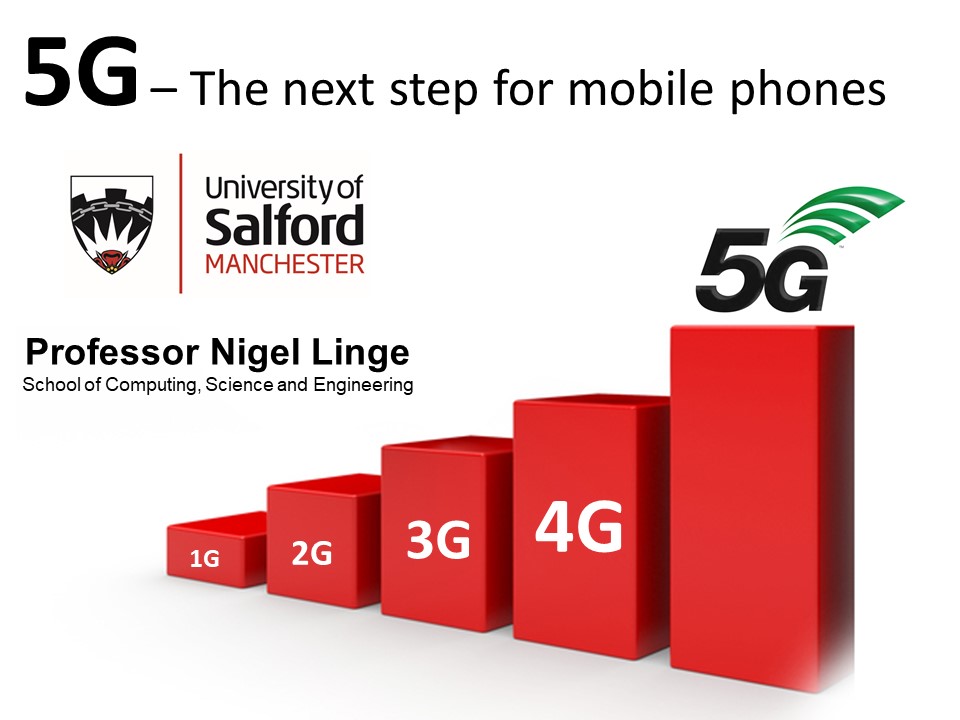
In December 2017, the world took an important step forward in the development of the next generation of mobile phones when the first standard for 5G was published. The journey to this point began back in the 1980s when the first generation of analogue mobile phones was introduced. The move to 2G in the 1990s heralded improved communications and the introduction of data services. The third generation subsequently brought better Internet connections and then 4G offered high-speed broadband connectivity. This talk however, examines the latest moves towards 5G, what that entails and what its impact might be. The talk will explore why 5G is needed, how it differs from 4G, what technical challenges need to be overcome and which new applications and services will become available.
-
From Man on the Moon to life in cyberspace
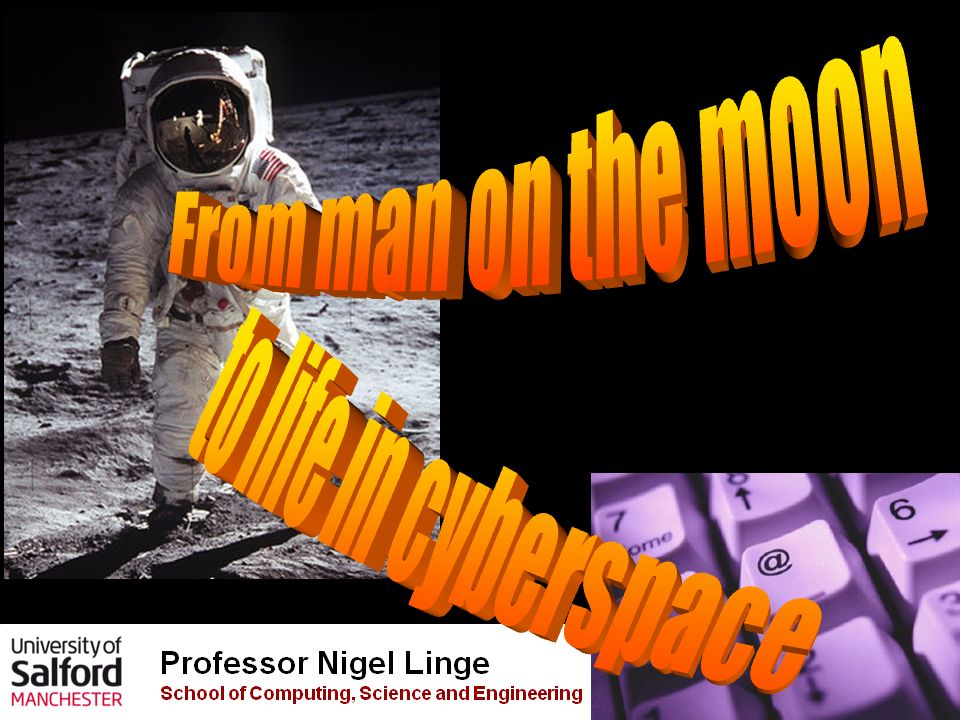
In 1969 Apollo 11 touched down on the surface of the Moon, however, a lesser known fact is that in December of that same year the first four computers were connected together to form what we now know as the Internet. This talk takes as its starting point 1969 and looks at how the early development of the Internet was achieved. From there it goes on to trace the evolution of both the Internet and the World Wide Web to create a new world known as cyberspace. Today, virtually every aspect of our daily lives is impacted and influenced by the Internet. Mankind may well have made a giant leap on reaching the Moon but cyberspace has potentially had a far greater impact on us all!
-
How Manchester Cotton wired up the world
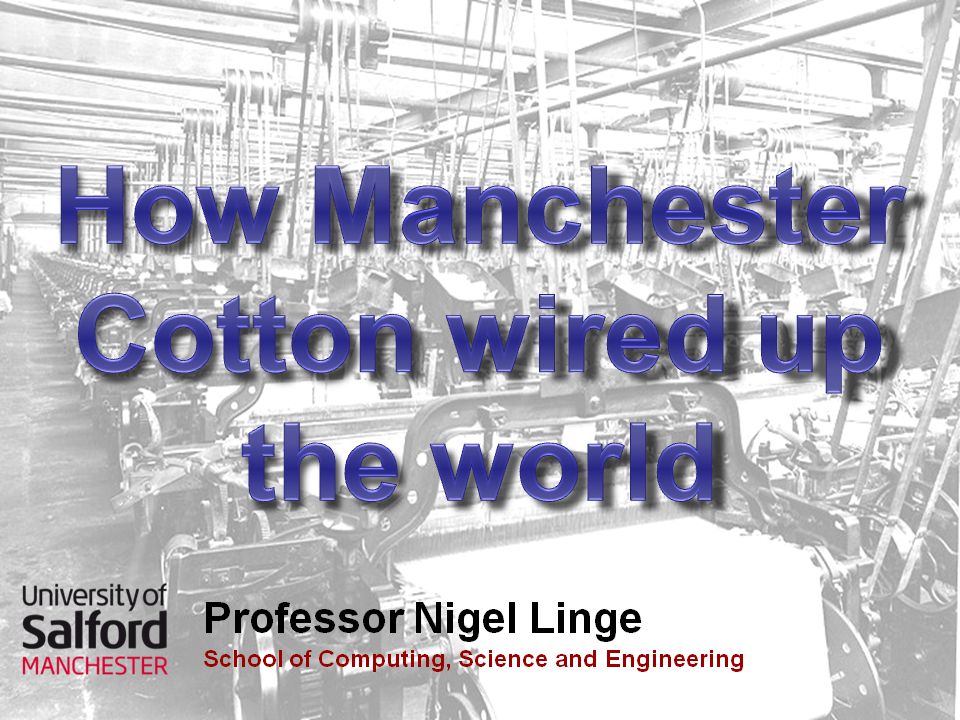
In the mid-1800s, the Lancashire Cotton industry dominated the world market for finished cotton goods pieces. However, since cotton was not grown in the UK it had to be imported which generated significant trade across the Atlantic. This and other industries therefore drove a business case for improved global communications and from that, a desire to link the telegraph networks of the UK and USA with a copper cable under the Atlantic. Nothing on this scale had been attempted before and so this talk tells the heroic story of the engineers and businessmen who battled numerous setbacks to deliver this pioneering achievement. The talk goes on to show how the trans-Atlantic telegraph cable of 1866, which owed much of its success to a Manchester based cotton merchant, then spawned a telecommunications revolution that delivered the world’s first global network that encircled the planet by 1902.
-
Our wireless world
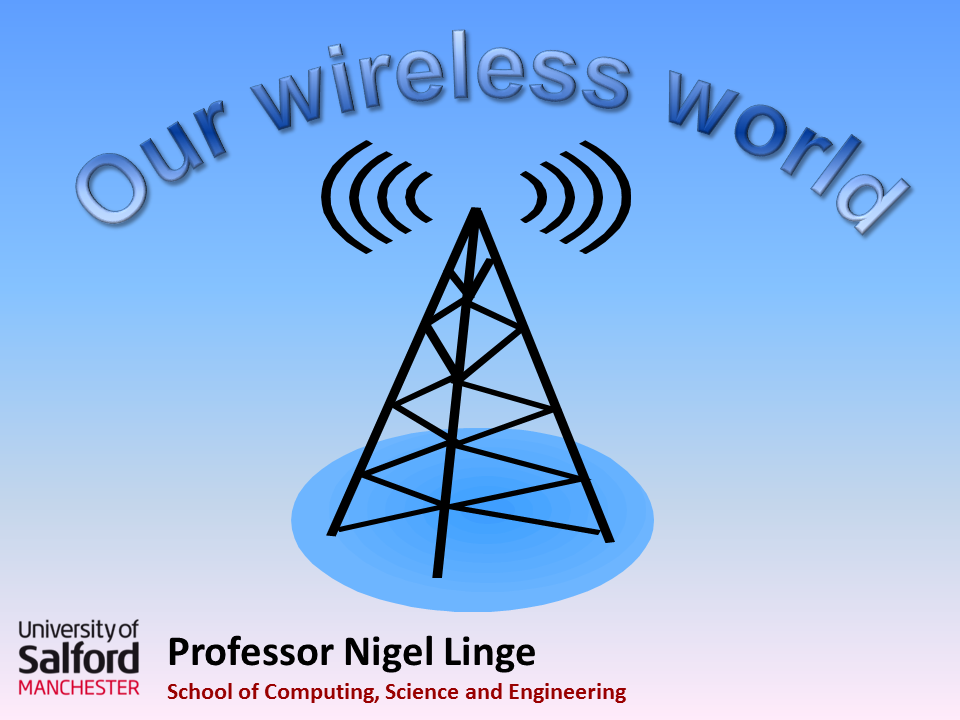
We are today more reliant on wireless communications than ever before. Our smartphones use the latest 4G wireless technology, we access the Internet from home using tablets and laptops connected via Wi-Fi, our ability to navigate is increasingly dependent on the GPS signals transmitted by satellites and television programmes reach us thanks to radio broadcasting. This talk traces the history and key developments in wireless technology from the first theories put forward by James Clerk Maxwell to the practical realisation and exploitation of the technology as a viable means of communication. You will discover that it was a Welshman who was the first to transmit radio signals, how Chelmsford became a world centre for radio, how a military walkie-talkie gave us the mobile phone and the link between a film actress and World War Two torpedo that made both Bluetooth and Wi-Fi possible.
-
Superfast Broadband – from copper to fibre and 5G!
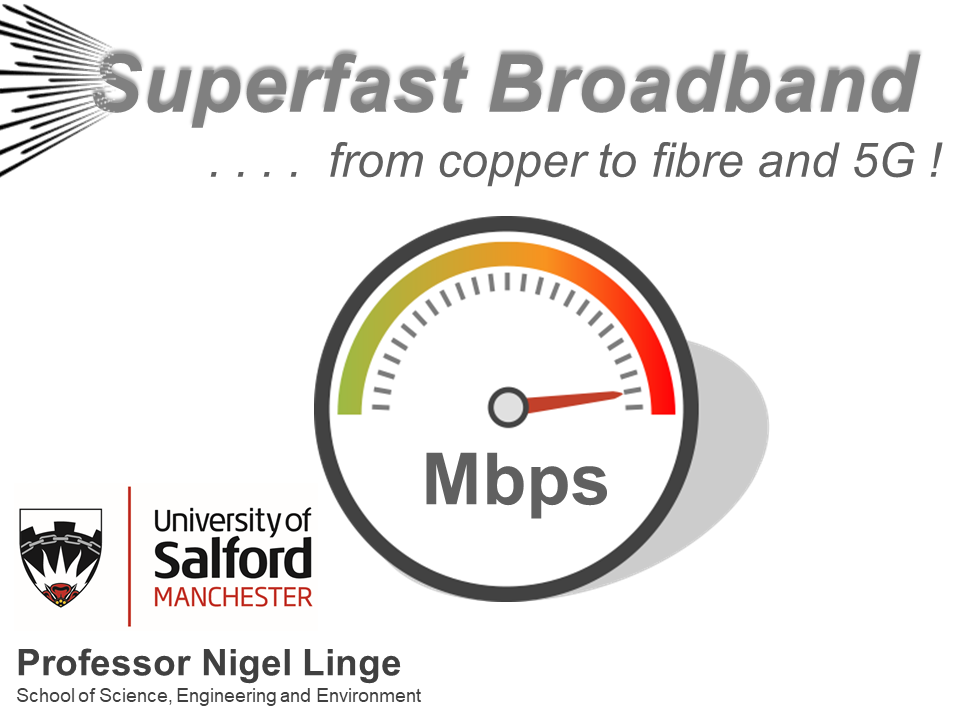
Most homes in the UK are connected by a pair of copper wires to a local telephone exchange. For many years, those wires were used solely for making and receiving telephone calls. However, the personal computer, the Internet and World Wide Web changed all of that and those wires started to carry data too! Today, a large part and in some cases all, of the copper infrastructure has been replaced by fibre to give you access to a seemingly infinite source of information, allow you to buy things online, bring you ultra-high definition television on demand and meet all of your social networking needs. How has all of this been possible? This talk examines how it all began with the modem and why that led onto the development of broadband and from there to today’s fibre based superfast connections which themselves are facing a new challenge from 5G . If you ever wondered how your Internet connection at home actually works, why speeds vary or what those large green metal boxes are for on your street, then this talk will explain all!
-
Telecom Towers – the visible face of telecommunications
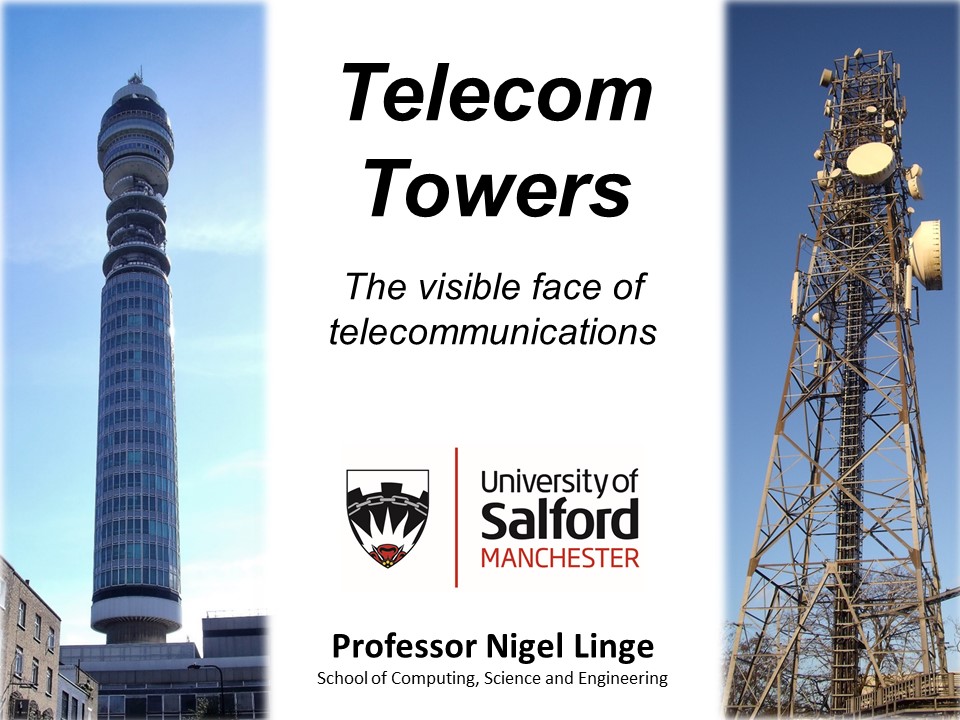
One of the most clearly visible aspects of the telecommunications industry are the many towers and masts, which adorn roadsides, roofs and hilltops. Indeed, our mobile phones only work because they are able to communicate with a myriad of small towers. From the days of the Armada, telecommunications towers have been used to ensure messages can be sent over many miles. Today, towers which are used to broadcast our television and radio programmes are some of the tallest structures in the country and at least one of London’s most iconic landmarks – BT Tower – was built primarily as a telecommunications tower. This talk showcases the many different types of telecommunications towers that exist, explains their usage, examines their evolution and construction, highlights some unusual and little-known features and in so doing brings to life an essential aspect of telecommunications on which our daily lives are so dependent but which often goes unnoticed.
-
Telstar – 50+ years of the telecommunications satellite
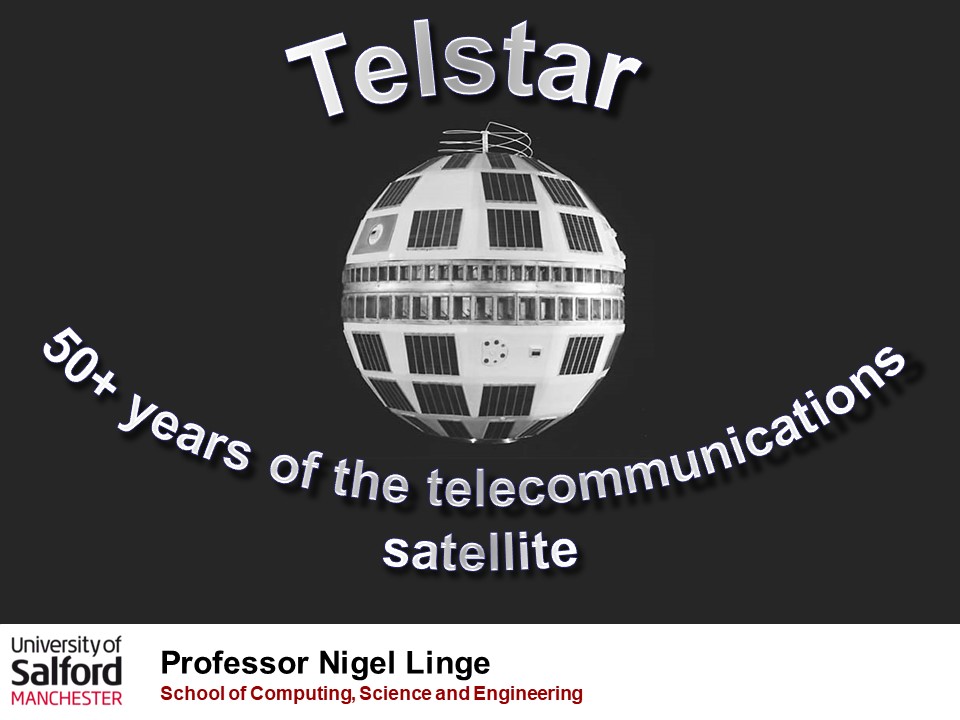
In October 1957, the world was amazed by Russia's Sputnik satellite, which became the first man-made object to orbit the earth. Whilst Sputnik and those that immediately followed it demonstrated the potential of satellites, it was not until the launch of Telstar in July 1962 that the world would truly be able to exploit the full potential of a telecommunications satellite in space. This talk tells the story behind Telstar, its capabilities, the importance of Goonhilly Downs in Cornwall, and the world firsts in television and telephone transmission across the Atlantic that it delivered. From there the talk will show how today’s satellites allow you to receive hundreds of television channels, pinpoint your location on the planet, know whether it will rain tomorrow, make telephone calls from the remotest parts of the world and browse the web whilst flying at 30,000 feet!
-
The call what he made – UK mobile phone story
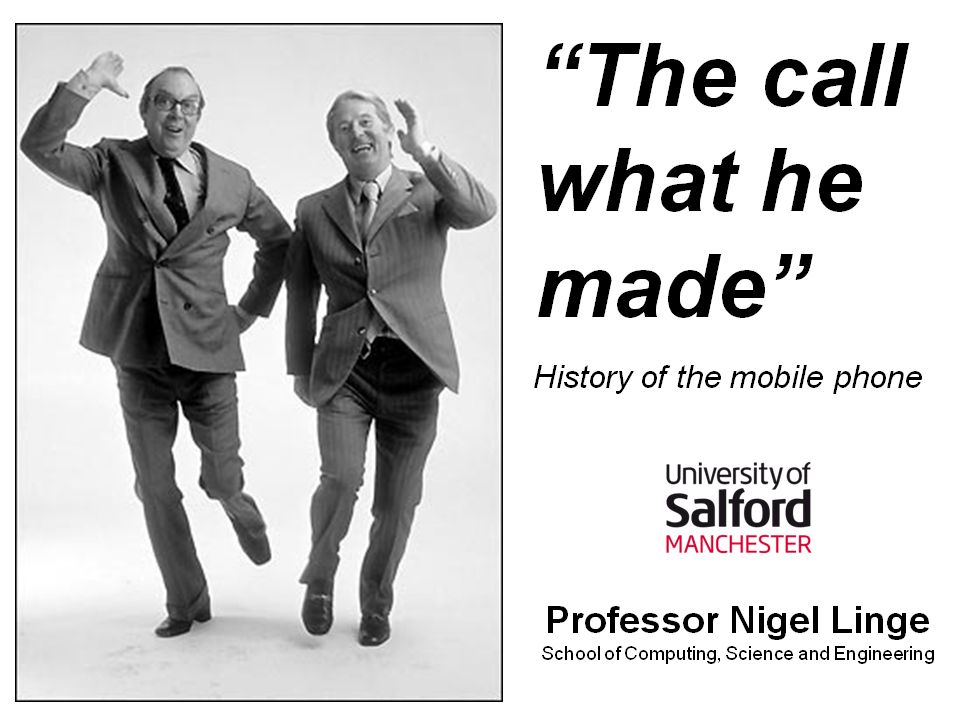
Comedian Ernie Wise was one half of the UK’s hugely popular comedy double act, Morecambe and Wise, and was famous for the “plays what he wrote!” However, on 1st January 1985 Ernie Wise made history by inaugurating the UK’s first mobile telephone network. This therefore was “the call what he made” that signalled the start of our mobile communications revolution which today has resulted in the situation where there are now more mobile phones than people in the country. Those early mobiles were huge, extremely heavy, very expensive, had limited battery life and could only make telephone calls. This talk tells the story of how that technology evolved over a relatively short period of time to deliver today’s smartphone that acts as our gateway to the web, ensures that we have a camera with us at all times, can pinpoint our physical location within a few metres on the planet’s surface and has transformed our lives and the very nature of how we communicate.
-
The Internet of Things (IoT)
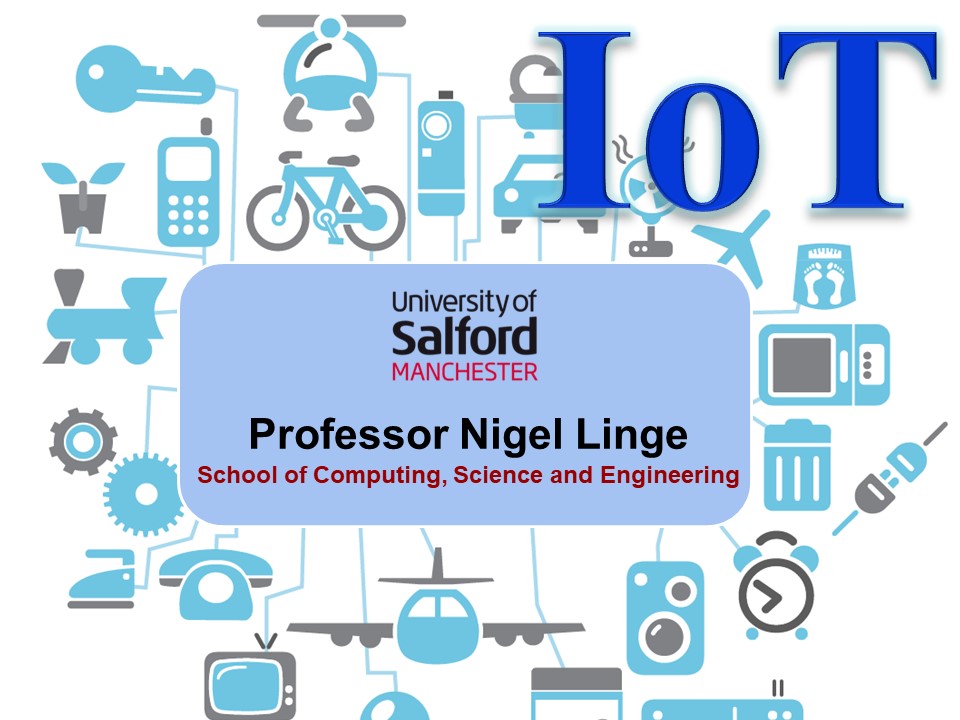
The Internet began life in 1969 as a means of connecting together large, expensive, mainframe computers. However, the creation of the World Wide Web changed that and through the later developments in social media, turned the Internet into a means of connecting people. Now in the 21st century the Internet is going through another transformation with a focus this time on connecting more and more physical objects or things. People can already connect and remotely control their central heating, our cars are increasingly filled with technology that communicates via the Internet, companies are testing the use of drones for delivering goods, factories are adopting more and more automation and our cities are now becoming intelligent. This talk will explore how the Internet of Things (IoT) is set to transform our lives.
-
The Red Box – the history, evolution and future of the phonebox
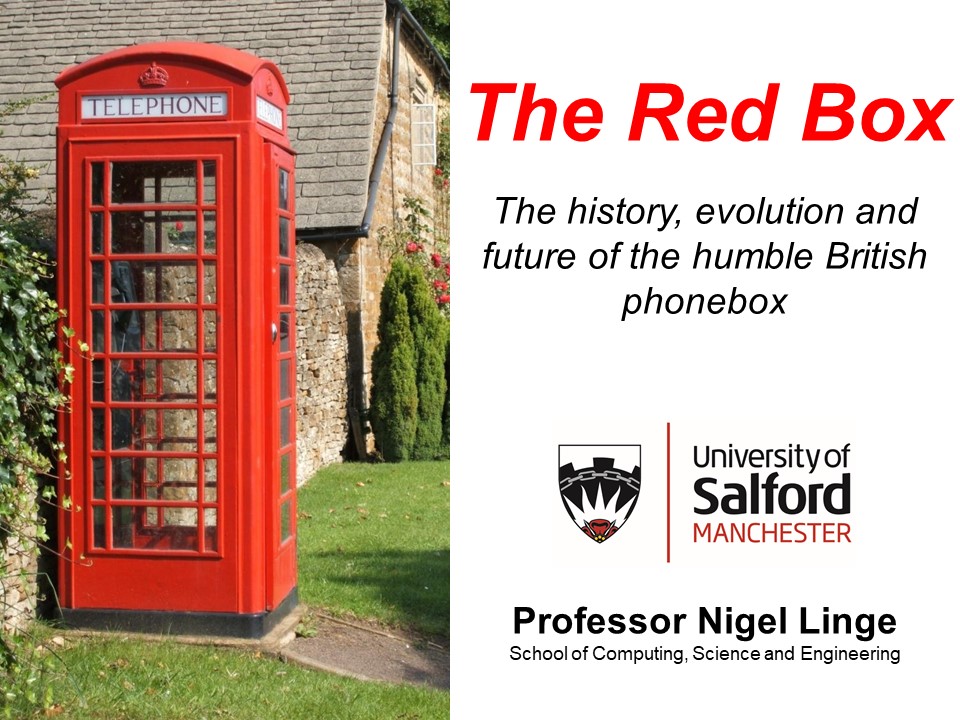
It has achieved iconic status; it symbolises Britain; but it is now seldom used! The British phonebox has been part of our landscape since 1921when the first K1 model was introduced. However, it was the K2 design by Sir Giles Gilbert Scott and then his much more numerous K6 design that established the now familiar and iconic red box on our streets. Today the mobile phone generation have probably never stepped inside a phonebox let alone used one. Nevertheless, there they remain as an essential part of what makes Britain, Britain! This talk looks at the history and evolution of the humble British phonebox through all of its major models, including those that were introduced by organisations other than BT and also the one that is now more famous because it is used by a Time Lord. It will conclude by showing the latest designs that are appearing on our streets, looking at how many are being given a new lease of life as something quite different and also show that, actually, they are not all painted red!
-
The Winged Messenger
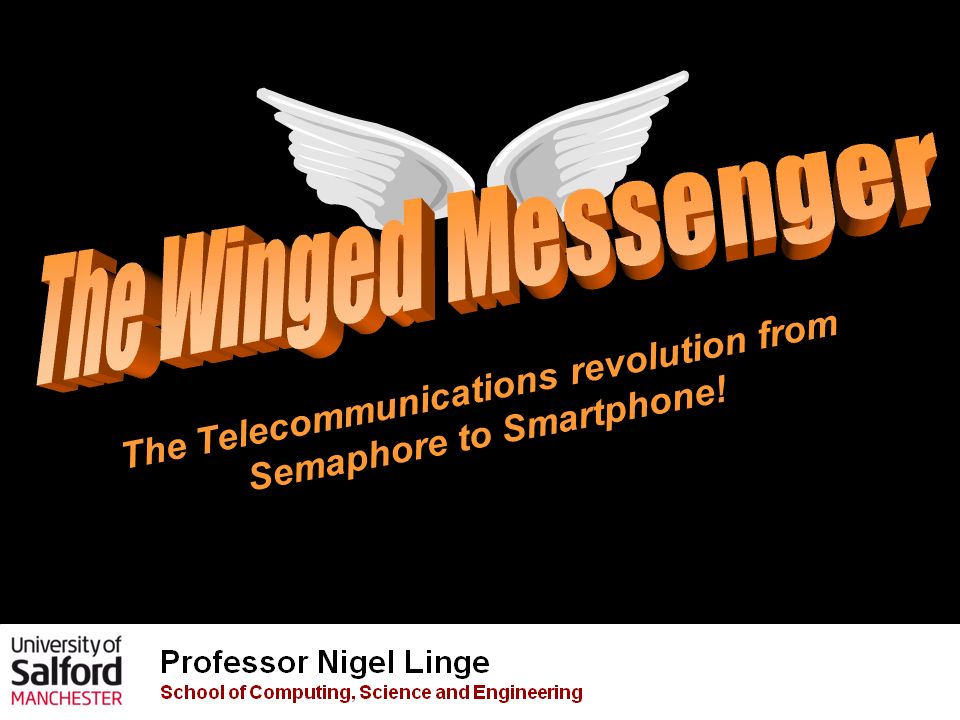
From the earliest times, our ability to communicate with one another has been essential to our evolution. Even the Gods of Ancient Rome understood this and made Mercury their messenger. With his winged sandals, traveller’s hat and serpents to protect him, Mercury could be relied upon to deliver all of the Gods’ messages quickly and reliably. This talk will show how technology of the day has always been exploited to improve our ability to communicate over greater and greater distances and at an ever-faster speed. Enjoy a whistle-stop tour through 2,500 years of history that takes you from the early forms of semaphore signalling to today’s all powerful smartphones that provide access to a seemingly infinite source of information and keep us connected wherever we happen to be, twenty four hours a day!
-
Undersea optical cables – the technology that powers the Internet
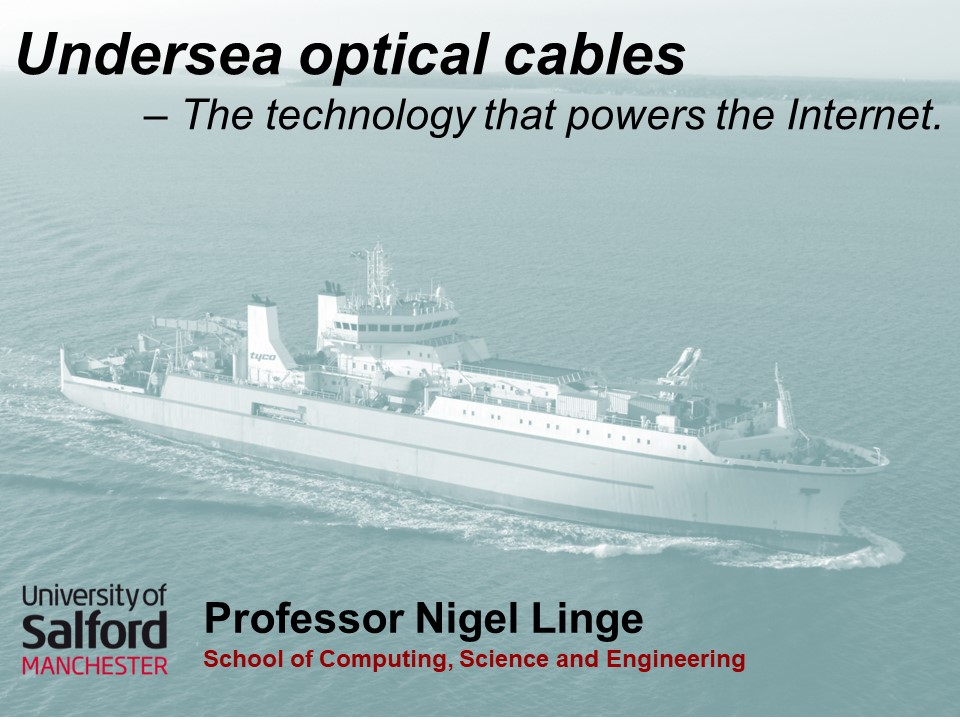
It is a common misconception that the bulk of our telephone and Internet traffic is transmitted around the world via satellites. Whereas, in fact, more than 95% of our communications is transmitted as light travelling along optical fibre cables laid on the bottom of the world’s oceans. This talk begins in the Victorian era when undersea copper cables were used to build the world’s first global telegraph network. It then goes on to explore in detail today’s undersea optical cables, showing how cables are laid and maintained, looking at the internal workings of a modern-day cable ship and explaining how today’s global network can carry huge amounts of data. When making an international telephone call or using the Internet you are benefitting from this network of undersea optical cables.
You can download the above list as a PDF file by clicking the button below.
Available talks (PDF)
Enquiries, bookings and venue requirements
If you wish to make an enquiry or booking for a talk to your group please use the following contact options:
Email:
n.linge @ salford.ac.uk
Telephone:
0161 295 4759
Post:
Professor Nigel Linge
School of Computing, Science and Engineering,
University of Salford,
Salford,
Greater Manchester.
M5 4WT
Please note that it is becoming increasingly common for lectures to be booked twelve or more months in advance of delivery.
Venue Requirements
All that is required at the venue is the provision of a projector screen (or suitable wall for projection onto), easy access to mains electricity, tables on which to place a laptop/projector and the range of physical artefacts that are brought along as visual aids and additional interest for the audience. Car parking close to the venue is also preferred for ease of handling equipment.
Biography of Professor Linge
Nigel Linge is Professor of Telecommunications at the University of Salford with over 30 years experience as a member of academic staff. He is an electronic engineer by profession who specialises in data communication networks and their applications. His research, which has a strong industry involvement, covers 5G mobile, location and context based services, communication protocols, the delivery of multimedia services, network design and architectures. He also takes a keen interest in telecommunications heritage and maintains an active outreach portfolio which includes the delivery of public talks and appearances in the media such as BBC TV Timeshift “Dial B for Britain” and as a regular newspaper reviewer for BBC Radio Manchester. In addition to writing academic research papers, Nigel has also co-authored two books, “Thirty years of mobile phones in the UK” and “The British Phonebox”. Nigel is a Chartered Engineer and Chartered IT Professional, a Fellow of the Institution and Engineering and Technology, British Computer Society and the Institute of Telecommunication Professionals. In 2013 he was chosen as the presenter of the Institute of Telecommunication Professionals’ Family Christmas Presentations for which he delivered his lecture entitled, “Your world in your hand” at five venues around the UK.
Testimonials
Many thanks once again for your excellent talk to us at Altrincham Probus today. The number of hands going up for questions immediately you finished your presentation was testament indeed to the degree of interest engendered. The quality of the graphical images and the ‘special effects’ also gave rise to quite a bit of comment.
Altrincham Probus Club, April 2019
Who would think that the history of the Mobile phone could be so informative and entertaining? Well, thanks to Professor Nigel Linge who turned what sounded like a dry subject into both. A welcome return for this speaker.
Appleton Park Women’s Institute, February 2019 (via Twitter)
Just to say thank you on behalf of our club members for your talk this morning. Enjoyable and educational at the same time! Look forward to seeing you again in 12 months time.
Weaver Probus Club, January 2019
Thank you very much for an outstanding talk yesterday, full of information but put over in a way that all members could understand, irrespective of their level of scientific understanding.
Flintshire U3A (Science Group), July 2018
Many thanks for your most interesting talk Last Weds. You held the audience in the palm of your hand. The subject was one I knew very little about. The visual presentation kept my interest. And best of all you credited the audience with intelligence.
High Lane U3A, June 2018
I would like to thank you once again for your talk last Friday morning. I have had great feedback from our members which is always nice for the Speakers Secretary to hear. “How Manchester Cotton Wired Up the World” was a very informative and entertaining talk that would suit most audiences.
Lytham St Annes U3A, June 2018
Just a quick email to thank you yet again for a brilliant talk this morning. I have had lots of positive feedback and I am sure everyone will have got something from it.
Heatons Reddish U3A, March 2018
Just a note to say thank you so much yet again for your excellent talk yesterday, and I have heard from several members who all really enjoyed the morning. I shall thoroughly recommend you at the next joint meeting. So thanks again and all the best.
Congleton Dane Probus Club, March 2018
Just to say thank you so much for last night. I have received good feedback from attendees and everybody certainly seems to have enjoyed the evening.
Timbersbrook Women’s Institute, January 2018
It was lovely to meet you and even lovelier to be present at your talk. So interesting. The feedback was great from a host of different people. From folk who have an interest in technology the feedback was brilliant.
St Helens U3A, January 2018
Thanks for tonight. Excellent talk, very entertaining. Really liked the history and the stories. Brought many memories.
Kendal and District Engineering Society, October 2017
Very many thanks for your most interesting presentation at our conference on Saturday. I am sure that we shall all be looking at telecom masts and towers with much greater interest and understanding in future, and perhaps photographing them for posterity. Thank you again for your important contribution to what was generally considered to be a most successful day.
Cumbria Industrial History Society, October 2017
It’s thanks to you for an excellent presentation which had the audience engrossed and reminiscing.
IET Merseyside and Western Cheshire Network, September 2017
Many thanks for last night. Everyone thoroughly enjoyed the fascinating talk. We would like you to come back please and do “The Internet of Things” next year.
Goostrey Probus Club, September 2017
Many thanks indeed for coming to Wilmslow and giving such a fascinating and educational talk. Our members really enjoyed it and there have been lots of complimentary comments. It was pitched just right for all levels of prior knowledge, as you could tell from the questions posed.
Wilmslow U3A Science and Technology Group, May 2017
Many thanks for coming to talk to the Guild last Tuesday, it was a very interesting and entertaining talk and much appreciated by the ladies. We would like to welcome you back at some stage next year.
Worsley-Roe Green Townswomen’s Guild, May 2017
Thank you for the excellent talk you gave yesterday which was widely appreciated by the membership. Many thanks also for the effort you made to be with us in very good time.
Knutsford Tatton Probus Club, April 2017
Many thanks again for a superb presentation. Many members approached afterwards to say how impressed they were with your talk.
Vale Royal Probus Club, July 2016
Another excellent talk. Am still getting compliments about the talk so thanks again.
IET Merseyside and Western Cheshire Network, March 2015
Very many thanks for your talk on Telstar yesterday. It was very much enjoyed by all 38 attending, and I received several very positive comments from our members. You pitched the talk at just the right level for scientists and non-scientists alike! Congratulations! We will certainly be asking you to come again to talk to us in the future.
Stockport U3A Science and Technology Group, December 2014
Professor Nigel Linge attended Bollington Probus Club on Tuesday 9th September and gave us a talk on How Manchester Cotton Wired the World. He made the talk interesting, funny in places, not over technical and his delivery was excellent. Several of our members are hard of hearing or deaf and these are the ones who usually have difficulty understanding what the speaker is saying, even though we have a loop system. It was a first time that every one of these members gave me a positive response, with comments like that was the best talk we have ever had, or what a great speaker, I heard every word. We would very much like to book Nigel for further talks and I’m sure they will be equally well received.
Bollington Probus Club, September 2014
We have held a Speakers meeting since our inception nearly 10 years ago, that is, over 100 people have addressed the meeting. I have been a member for 6 years, and can say with absolute confidence that Nigel’s address was the best yet. He was not only highly informative, but also highly entertaining and explained a potentially difficult subject with aplomb. I have talked to a number of my colleagues and other members, who would endorse every word of these comments. I have no hesitation in recommending Nigel to any group.
Upholland U3A, July 2014
I wanted to thank you again for your excellent talk at Tarporley U3A last Thursday. We really enjoyed it and thought it very well presented. Those members who attended are still talking about how good it was.
Tarporley U3A, June 2014
Thanks again for presenting on our annual Lecture programme. Judging by everyone in the audience stayed all the way till the end, and the number of questions during Q and A time and after the talk around you, I felt the lecture was well received. The exhibits you brought along also made the lecture so much more interesting.
IET Manchester Network, April 2014
Please accept this belated 'thank you' for the talk that you gave. The feedback from my fellow members is unanimously appreciative and we all look forward to your next visit, which I am pleased to say is already booked.
Prestbury 91 Probus Club, January 2014
People are still talking about this year’s presentation, especially the younger attendees. Professor Nigel Linge from the University of Salford, a truly enthusiastic supporter of anything linked to communications, delivered entertaining, thought provoking and very educational lectures with numerous mobile phones on hand from the last 40 years! It was amazing especially the demonstration of how mobile phones work using nothing more than some coloured plastic balls and four buckets.
The Institute of Telecommunications Professionals, December 2013
I took my 10 year old son to the talk, and he is still enthusing about it this morning.
I’ve been in the industry for many years, but I have learned something new today, well done.
Attendees at the ITP Christmas Family Presentations, December 2013
A super-big thank you for your talk last night. It really did go down a storm with the attendees. From my point of view, it was a delight to know that I was in the hands of a master - the talk was informative, interesting and entertaining - with a really nice level of engagement with the audience. And all beautifully managed in terms of timings. What more could one ask for! It really was the perfect centrepiece to the evening - and provided an excellent catalyst for discussions between delegates afterwards.
IET Gloucester Network, July 2013
As a speaker you are brilliant. All four talks have been easy to understand and informative. All our members look forward to seeing you again and again. I have organised about 230 talks and you are right at the top of the list.
Urmston Park Probus Club, March 2013

Follow on social media .....